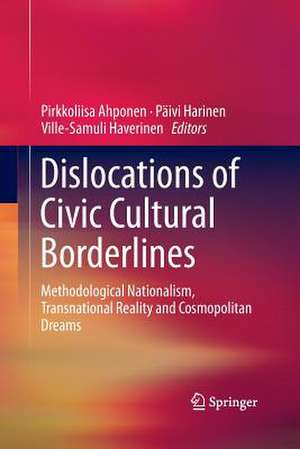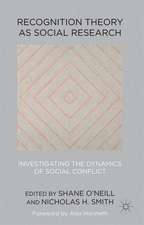Dislocations of Civic Cultural Borderlines: Methodological Nationalism, Transnational Reality and Cosmopolitan Dreams
Editat de Pirkkoliisa Ahponen, Päivi Harinen, Ville-Samuli Haverinenen Limba Engleză Paperback – 23 aug 2016
| Toate formatele și edițiile | Preț | Express |
|---|---|---|
| Paperback (1) | 383.33 lei 6-8 săpt. | |
| Springer International Publishing – 23 aug 2016 | 383.33 lei 6-8 săpt. | |
| Hardback (1) | 390.63 lei 6-8 săpt. | |
| Springer International Publishing – 20 noi 2015 | 390.63 lei 6-8 săpt. |
Preț: 383.33 lei
Nou
Puncte Express: 575
Preț estimativ în valută:
73.35€ • 75.67$ • 61.21£
73.35€ • 75.67$ • 61.21£
Carte tipărită la comandă
Livrare economică 26 martie-09 aprilie
Preluare comenzi: 021 569.72.76
Specificații
ISBN-13: 9783319368672
ISBN-10: 3319368672
Pagini: 199
Ilustrații: XII, 199 p.
Dimensiuni: 155 x 235 mm
Greutate: 0.3 kg
Ediția:Softcover reprint of the original 1st ed. 2016
Editura: Springer International Publishing
Colecția Springer
Locul publicării:Cham, Switzerland
ISBN-10: 3319368672
Pagini: 199
Ilustrații: XII, 199 p.
Dimensiuni: 155 x 235 mm
Greutate: 0.3 kg
Ediția:Softcover reprint of the original 1st ed. 2016
Editura: Springer International Publishing
Colecția Springer
Locul publicării:Cham, Switzerland
Cuprins
Chapter 1. Introduction; Pirkkoliisa Ahponen.- PART I. Belonging to Membership: changing Frames of Citizenship.- Chapter 2. Living in an Age of Migration and Diasporas; Zygmunt Bauman.- Chapter 3. Contents of Citizenship? Multiple Citizens' Orientations towards Nationality and Different forms of Citizenship; Jussi Ronkainen.- PART II. Studying Dislocations: From Methodological Nationalism to Methodological Cosmopolitanism.- Chapter 4. Which Side?: young Multicultural Generation Facing Nationalistic Research Frameworks; Päivi Harinen and Antti Kivijärvi.- Chapter 5. Embodied and Moral Methodological Cosmopolitanism in Opposition to the Rise of Neo-Nationalism: A Micro-Analytical Perspective; Sofia Laine.- Chapter 6. Political Transnationalism as a Matter of Belongings: Young Kurds in Finland; Mari Toivanen.- Chapter 7. Marginal Actors? Diaspora Somalis Negotiate their Citizenship; Mulki Al-Shamani and Cindy Horst.- PART III. Complex Preconditions of Cosmopolitan Citizenship: Toward Learning Society.- Chapter 8. Dilemmas of Cosmopolitan Education in the Context of Transnationalism; Devorah Kalekin-Fishman.- Chapter 9. The Internationalisation of higher Education: Multicultural, Transnational and Cosmopolitan Perspectives Approached; Anna Medvedeva and Pirkkoliisa Ahponen.- Chapter 10. Is Education Still Enough? Skilled Sub-Saharan Africans Face the Nordic Labour Market; Mathias Ebot.- Chapter 11. From Locals to Cosmopolitans: Transferring the Territorial Dimensions of Cultural Citizenship; Pirkkoliisa Ahponen.- Chapter 12. Afterwords: Päivi Harinen.
Notă biografică
Pirkkoliisa Ahponen (Ph.D.) Professor (Emerita) Department of Social Sciences at the University of Eastern Finland. Her earlier research dealt with every day-life issues and comparative evaluations of institutional cultural policy. The current research topics concern problems of politics of culture and socio-cultural border-crossings with aims to decrease alienation and advance social and cultural equality of transnational citizens. Expertise of environmental policy issues in developing countries is included in her current interest areas from the theoretical perspective of risks to reflexive modernization. Recent articles include: “Miserable or Golden Karelia? Interpreting a Cross-border Excursion of Students from Finland to Russia”. Journal of Borderland Studies vol. 26. nr. 2. 2011, 2159–1229, and “A Cultural Transformation: The Design of Alienation in the Guise of Creativity” in Devorah Kalekin-Fishman & Ann Denis (eds.) The Shape of Sociology for the 21st Century. Tradition and Renewal. (2012) SAGE. Los Angeles, London, New Delhi, Singapore & Washington DC, 254–266. Päivi Harinen (Ph.D.) University lecturer of sociology Department of Social Sciences at the University of Eastern Finland Her research has focused on young people’s societal and cultural memberships, as well as discrimination and racism as forms of social isolating. Her contemporary research deals with diaspora citizenship in different societal contexts and states.
Päivi Harinen (Dr.Soc.Sc) works as a University Lecturer for sociology at the University of Eastern Finland. Her research interests deal with social inequality defined by age, ethnicity, and place of residence.
Ville-Samuli Haverinen (M.Soc.Sc.). Previously (2012–2014), Haverinen has worked as a Junior Researcher in a four-year research project entitled Context of Diaspora Citizenship – Transnational Networks, Social Participation and Social Identification of Somalis in Finland and in theU.S. at the University of Eastern Finland. At present, Haverinen works as a part-time Project Secretary at the University of Jyväskylä, Finland. He is a member of a work group that is responsible to organize the 12th Somali Studies International Association Congress. Revisiting Somali Identities – Addressing Gender, Generation and Belonging in Helsinki, Finland in August 2015. Haverinen is also a Ph.D. student at the Department of Social Sciences at the University of Eastern Finland. His research interests focus on the extent to which national models of immigrant integration can provide an explanation for the reality of different political-juridical surroundings as will be empirically observed by analyzing citizenship and integration policies and legislation in Finland and the United States.
Päivi Harinen (Dr.Soc.Sc) works as a University Lecturer for sociology at the University of Eastern Finland. Her research interests deal with social inequality defined by age, ethnicity, and place of residence.
Ville-Samuli Haverinen (M.Soc.Sc.). Previously (2012–2014), Haverinen has worked as a Junior Researcher in a four-year research project entitled Context of Diaspora Citizenship – Transnational Networks, Social Participation and Social Identification of Somalis in Finland and in theU.S. at the University of Eastern Finland. At present, Haverinen works as a part-time Project Secretary at the University of Jyväskylä, Finland. He is a member of a work group that is responsible to organize the 12th Somali Studies International Association Congress. Revisiting Somali Identities – Addressing Gender, Generation and Belonging in Helsinki, Finland in August 2015. Haverinen is also a Ph.D. student at the Department of Social Sciences at the University of Eastern Finland. His research interests focus on the extent to which national models of immigrant integration can provide an explanation for the reality of different political-juridical surroundings as will be empirically observed by analyzing citizenship and integration policies and legislation in Finland and the United States.
Textul de pe ultima copertă
This book examines changes of citizenship in the light of dislocated habitations. It highlights the ways in which the membership in a local community is shifting away from national frameworks, and explores the dislocations brought about by transnational and cosmopolitan forms of belonging. Containing theoretical, methodological and political contributions, the volume takes part in the social political and cultural discussion around migration, transnationalism, multiculturalism, multiple citizenship and cosmopolitan civic activities. It presents dislocation as a covering concept and a metaphor for describing circumstances in which the conventional ways and frames of conducting social scientific analysis, social policies, or politics no longer suffice. The book shows how scientific and political projects, educational curricula and policy institutions still lean mainly on the logics of mono-cultural nation-states and citizenships, without recognizing the dislocated nature of contemporary citizenship and civil society. Offering solutions, the book proposes new ways of collecting data and conducting analyses, explains the new logics of citizenship and civic activities, and offers tools for developing civic and citizenship policies that consider the transnational reality of people’s everyday lives and life histories.
Caracteristici
Offers a much-needed detailed and manifold examination of the phenomenon of dislocation Provides knowledge of how dislocated people asses and define their social and cultural locations Highlights the need for non-conventional methodologies to understand individual intentions in transnational circumstances


















